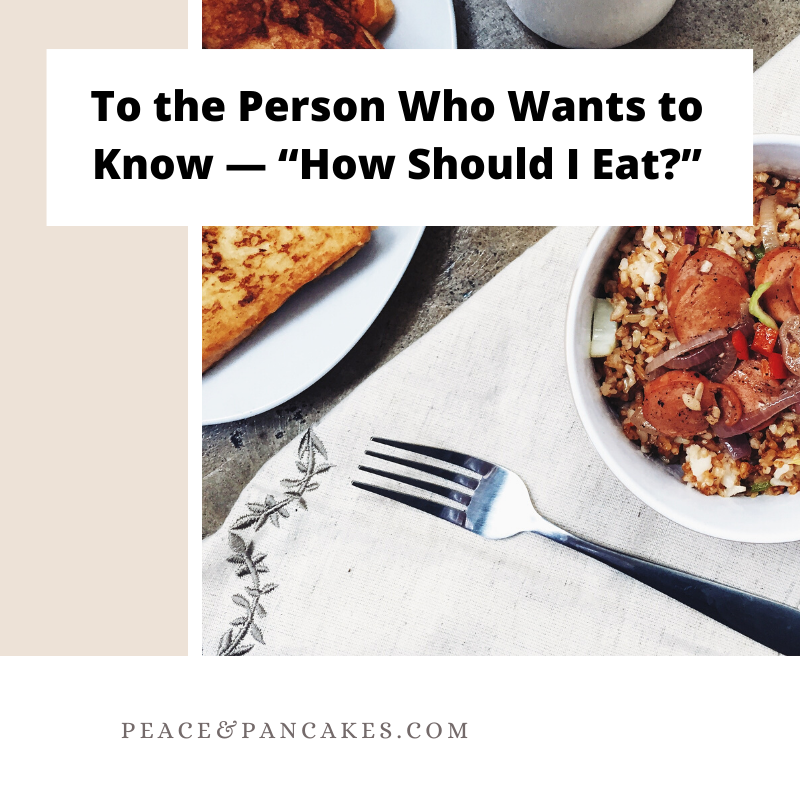To every person who has ever asked me how they should eat:
Let me start with an apology. I’m sorry that I don’t have a simple answer to your question.
I want to help you, but as a dietitian, I know that healthy eating is not something you learn from a book or an Instagram post or a 10-minute conversation. Healthy eating is not just a science. If it was, this would be an easy question to answer. More than a science, healthy eating is a behavior. Humans are complicated beings with complicated behaviors, which is why the answer to this question is…complicated.
Like learning how to ride a bike or play an instrument, learning how to eat healthfully in a way that works best for you takes practice. It will always be evolving for you, and it will most certainly never be perfect. As frustrating as it may be, what works for your best friend or your brother or that person you follow on Instagram might not work for you (and vice versa).
For example:
For some people, food tracking is an effective way to understand what kinds of foods energize their body best. For others, food tracking is an unnecessary source of stress and anxiety.
For some people, healthy eating means avoiding dairy due to lactose intolerance. For others, dairy foods are a delicious source of protein, calcium, vitamin D, and potassium.
For some people, healthy eating means avoiding gluten to manage celiac disease. Other people can tolerate gluten just fine, and gluten-containing whole grains are a great source of fiber and B vitamins.
For some people, meal prepping helps ensure they eat wholesome, balanced meals. For others, meal prepping means a stressful obsession over portion sizes and macronutrients.
As a dietitian, I am bound by a code of ethics and trained to provide evidence-based advice. This means I won’t provide you with nutrition recommendations until I know what you need. What’s your medical history? What’s your lab work look like? What medications are you taking? What’s worked for you in the past? What’s hurt you and held you back from making progress? What are your motivations, feelings, preferences? What do you already know? What do you want to know more about? What do you have the time, money, motivation, knowledge to do? Where can I fill in those gaps for you? Where do you need to step up to the plate and take some accountability?
I understand that this is probably frustrating because you want an easy answer. Here’s the hard truth. Eating is a behavior that you do multiple times a day. It is influenced by your energy level, hunger, cravings, medical diagnoses, emotions, stress level, time, motivation, knowledge, and past experiences. It is going to be fluid. It will never be a black and white. It will be different from day to day, from meal to meal, from snack to snack.
I cannot give you the perfect answer as to how to eat healthfully. I can only help you find your way there. I won’t sell you on a “simple path,” “ a quick fix,” or “a miracle diet,” but I’ll be your teacher and guide while you figure it out. Most importantly, I will not judge you, scold you, shame you, or guilt you.
So, again: I’m sorry that I don’t have a simple answer to your question. That’s because I don’t have the answer — you do. I’m just here to help you figure it out.
Sincerely,
Talia
Looking for a dietitian? Here’s a few tips:
- The Academy of Nutrition and Dietetics has a search tool to find dietitians in your geographic area: https://www.eatright.org/find-an-expert.
- Most insurance companies have a search tool on their website (or you can give them a phone call) where you can find dietitians contracted with your insurance.
- Just like doctors, many dietitians specialize in a specific area such as diabetes, gastrointestinal diagnoses, heart health, etc. If you are struggling with a specific issue, try google searching “dietitian [nutrition issue] [geographic location]” .
- Many PCP’s have relationships with dietitians for referrals. Ask your PCP at your next physical if they have any recommendations.
- Many dietitians are starting to offer consultations via video chat or telephone if you’re not feeling an in-person visit.

